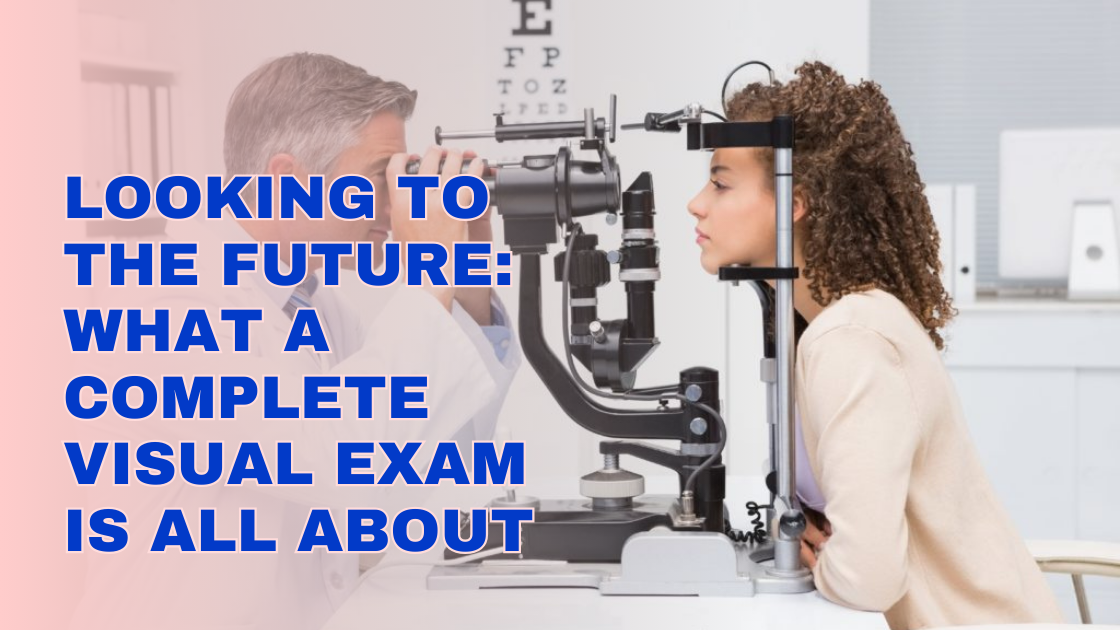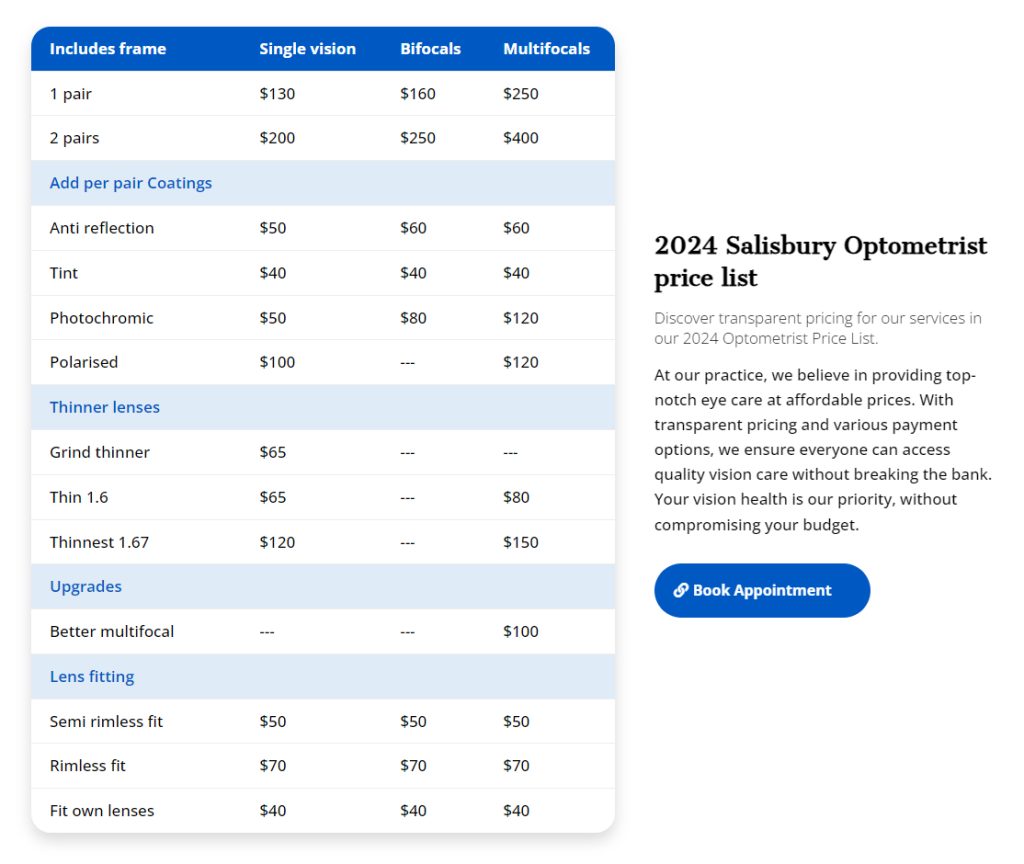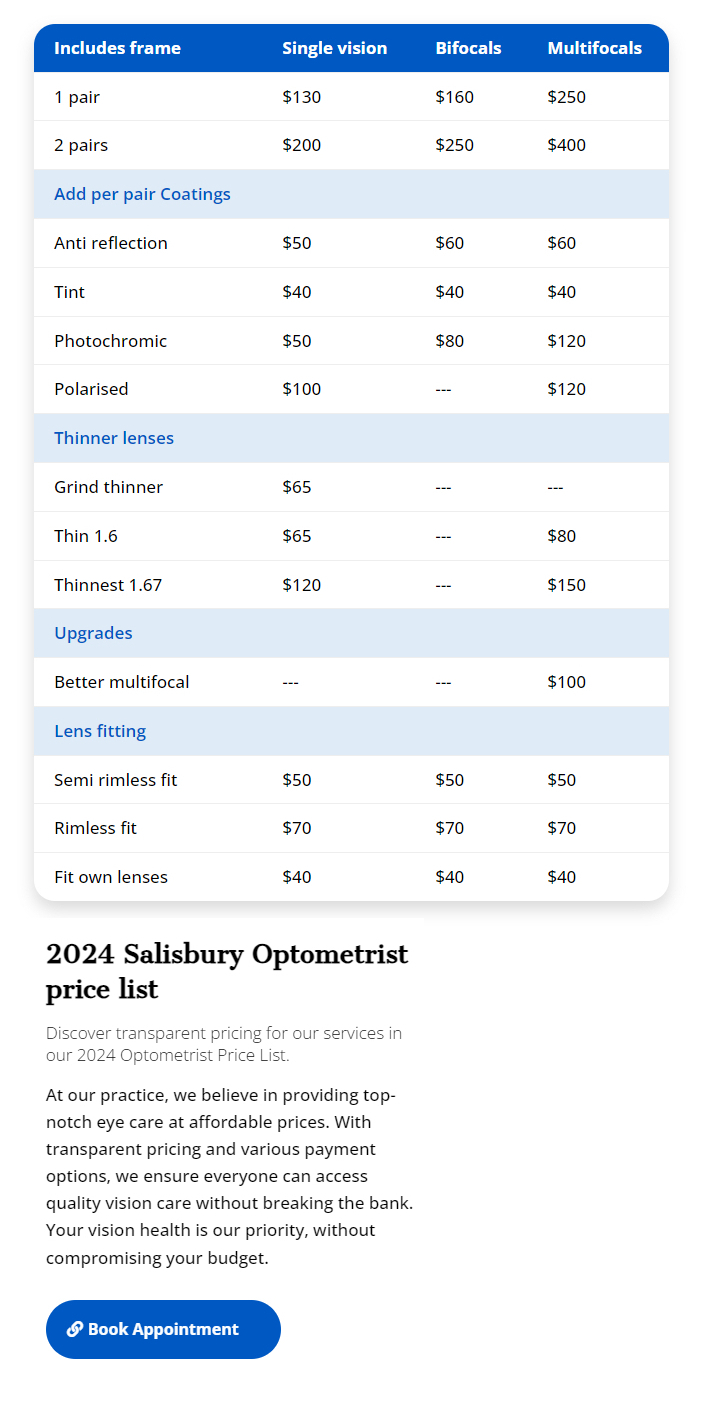A complete visual eye exam, especially if performed periodically, is the best way to prevent or detect at an early stage any disease that may compromise our vision.
In many cases, a comprehensive eye exam may be the only way to diagnose significant diseases in time, some of which can cause irreversible vision loss and, in the most extreme cases, even blindness.
At Salisbury Optometrist, we value your eyesight, health, and care. We have the best specialists and the latest technology in eye examination, so we take the opportunity to tell you all the details of the eye exams so you know what to expect.
What Does a Complete Eye Examination Cover?
A complete eye examination is a painless procedure in which an eye doctor or ophthalmologist thoroughly reviews our vision to confirm that we do not suffer from any anomalies or to make an accurate diagnosis of a pathology or vision problem.
Firstly, the ophthalmologist will carry out a review of the patient’s visual acuity and prescription, which helps him identify the existence of possible refractive problems: myopia, hyperopia, astigmatism, and presbyopia.
During the examination, the specialist examines the different parts of the patient’s eyes, especially those most susceptible to suffering from some type of pathology:
Anterior segment of the eye:
- Conjunctiva and the surface of the eye.
- Sclera.
- Cornea.
- Iris.
- Pupil
- Crystalline.
- Aqueous humour.
Posterior segment of the eye:
- Choroid.
- Retina.
- Taint.
- Fovea.
- Vitreous humor.
The dilated eye examinations also allow the doctor to see if any damage has occurred to the optic nerve, which occurs when a person has, for example, glaucoma.
What’s the Purpose of An Eye Examination?
The eye examinations in an eye care clinic look at the entire eye and visual system and are an important part of preventive health care. It could be compared to a physical eye exam that detects:
Vision problems and disorders:
- Glaucoma.
- Waterfalls.
- Retinal detachment.
- Macular degeneration.
Other health problems:
- Diabetes.
- High blood pressure.
- Brain tumours
The ophthalmologist who performs it relies on his training and experience, along with professional judgment, to direct the tests and interpret the results provided by automated computerized instruments.
Which Tests Does A Complete Vision Exam Include?
A complete eye examination may consist of the following tests: fundus examination, tonometry, visual field examination, and visual acuity examination. Let’s see what each of them consists of:
Deep Examination of the Eye with Pupil Dilation
First, the ophthalmologist puts a few drops in the patient’s eyes to dilate or enlarge the pupils. The professional then examines the eye through a special magnifying lens for signs of possible pathologies or damage to the retina and optic nerve.
Tonometry
This test measures eye pressure or tension. High pressure can be a sign of glaucoma, an eye disease characterized by loss of vision due to damage to the secondary optic nerve, usually caused by an increase in intraocular pressure (IOP).
Visual Field Examination or Campimetry
This test measures lateral or peripheral vision and consists of the patient focusing one or both eyes on a fixed point and indicating when they perceive, for example, a light point or an object placed in front of them. After comparing with the indicative values of healthy people, the doctor in charge of performing the examination assesses whether the patient’s visual field is normal or restricted.
Visual Acuity Test
An optotype is used, a table with which vision is measured at different distances. Typically the Snellen chart or a standardized card placed at a distance of 6 meters is used. Special tables are used when the exam is done at shorter distances. Some Snellen charts are video monitors that show letters or pictures, which are great for assessing the vision of children or people who cannot read.
These tests hardly cause any discomfort for the patient and are also quite quick. Of course, the effect of pupil dilation drops will cause your vision to be blurry (especially at close distances) for a few hours.
When to Go for An Eye Examination?
Your age and eye health will determine how often you need to have an eye examination.
In general, the times when it is advisable to do an eye test are:
- Children up to 3 years old.
- School-Aged Children.
- Teenagers.
- Adults.
Also, people who have their eyes checked regularly should be:
- Patients with vision problems.
- Patients who have had eye surgery or suffered an eye injury.
- Contact lens users.
- People taking medications with eye-related side effects.
- Professionals who perform jobs associated with specific risks to eye health.
- Patients with a personal or family history of eye diseases.
What to Do Before An Eye Examination?
In reality, no specific preparation is necessary for this exam except to avoid excessive caffeine consumption or the use of makeup in the area.
Some aspects that we could take into account are:
- Prepare a list of prescribed medications, information or records of previous surgeries, and any documentation that may be needed (for example, related to insurance).
- Prepare a history listing past and present vision and medical problems, as well as a detailed family history.
- In addition, you can reflect on visual needs at home, work, school, and play to accurately answer the ophthalmologist’s questions about the school/work environment and recreational activities. This is a common line of research that aims to determine the patient’s visual demands accurately.
Perhaps more important than the preparation before the eye examinations is the planning of the following hours, in which, if it has been necessary to dilate the pupil, driving is not recommended, and visual rest is advisable until this part of the eye returns to its normal state.
Final Words
If you want to be more prepared for this evaluation, you can also read our blog, which has quite useful articles about eye care.
Remember that comprehensive eye examinations provide important information about the health of your eyes and help detect potential eye problems. At Salisbury Optometrist, you can schedule an appointment to request your ophthalmological examination with our experts.
If you would like more information about an ophthalmological consultation or our services, contact us soon.




0 Comments